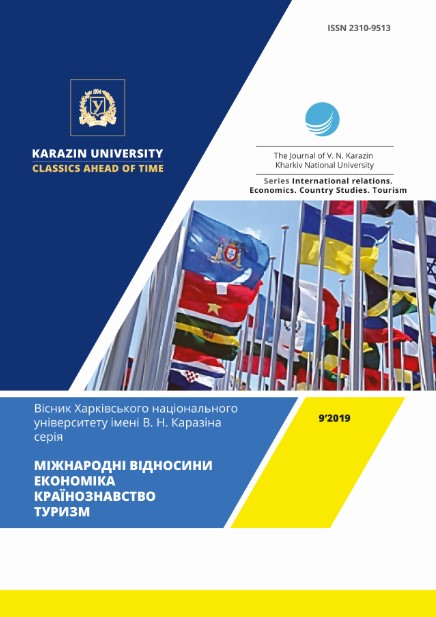Evolution of environmental management concepts in terms of global environmental challenges
Abstract
The relevance of the study is due to the fact that the economic development of civilization in the 21st century is accompanied by numerous environmental and social challenges that scientists around the world are constantly working on. Technogenic and natural disasters that occur on the planet are associated with climate change, which in turn, a significant number of researchers and world leaders believe is a consequence of economic activity. The subject of research of the article is the concept of sustainable development, which actually includes these three aspects: economic, social and environmental.. The goal is the evolution of the concepts of nature use in the context of global environmental challenges and their practical use in countries around the world. The objective is to research the concept of sustainable ecologically balanced development of the national economy. General scientific methods are used, such as system analysis. The following results were obtained: the transition to sustainable development has led to the emergence of numerous concepts of its implementation in the area of addressing sustainable use of natural resources. The theoretical substantiation of such in terms of the laws of thermodynamics is simply impossible, as well as the invention of "perpetual motion". However, the use of inexhaustible energy sources (such as thermonuclear, solar, geothermal, tidal, etc.) and renewable biological resources (transgenic, cloning, etc.) allows us to talk about the possibility of theoretical justification for sustainable ecologically balanced development. At the same time, relative, since this nature use is possible only within use) of the limits of balance in profit and expenditure (reproduction natural resources). Conclusions: implementation of sustainable development is possible only in the form of sustainable eco-balanced development based on rapidly renewable biological resources and the use of practically inexhaustible energy sources, as well as the use of high technologies. Such development can provide a solution to economic, social and environmental problems with the preservation of the natural complex.
Downloads
References
Bjoler, D. (2007). Ideja ta obov'jazkovistj vidpovidaljnosti za majbutnje. Filosofsjka dumka, 1, 2, 3, 117–134, 77–95, 81–99.
Dejli, Gh. (2002). Poza zrostannjam. Ekonomichna teorija stalogho rozvytku. K.: Intelsfera.
Bell, D. (2004). Gryadushchee postindustrialnoe obshchestvo. Opyt sotsialnogo prognozirovaniya (2oe izd.). M.: Akademiya.
Danilov-Danilyan, V. I., & Losev, K. S. (2000). Ekologicheskiy vyzov i ustoychivoe razvitie. M.: Progress-Traditsiya.
Vernadskiy, V. I. (1988). Nauchna mysl kak planetnoe yavlenie. M.: Nauka.
Meljnyk, L. Gh. (2006). Ekologhichna ekonomika : pidruchnyk (3e vyd.). Sumy: Universytetsjka knygha.
Doroghuncov, S. I., Pitjurenko, Ju. I., & Olijnyk, Ja. B. (2000). Rozmishhennja produktyvnykh syl Ukrajiny : navch.-metod. posibnyk dlja samost. vyvch. dysc. K. : KNEU.
Nadosha, O. V. (2011). Teoretyko-metodologhichnyj analiz stalogho rozvytku u konteksti suchasnykh doslidnycjkykh pidkhodiv. Derzhavne upravlinnja: udoskonalennja ta rozvytok, 10. Vzjato z http://www.dy.nayka.com.ua/?op=1&z=341 (data zvernennja 14.09.2018).
International Organization For Standardization. (2018). Environmental Management Systems-Specification With Guidance For Use. Retrieved from https://www.iso.org/standard/23142.html (data zvernennja 10.10.2018).
Ekologhija ta socialjnyj zakhyst. (2018). Proghrama Stalyj rozvytok. Vzjato z http://www.esz.org.ua/?page_id=2998 (data zvernennja 10.10.2018).
Authors who publish with this journal agree to the following terms:
- Authors retain copyright and grant the journal right of first publication of this work under the terms of a license Creative Commons Attribution License 4.0 International (CC BY 4.0).
- Authors are able to enter into separate, additional contractual arrangements for the non-exclusive distribution of the journal's published version of the work (e.g., post it to an institutional repository or publish it in a book), with an acknowledgement of its initial publication in this journal.
- Authors are permitted and encouraged to post their work online (e.g., in institutional repositories or on their website) prior to and during the submission process, as it can lead to productive exchanges, as well as earlier and greater citation of published work.




